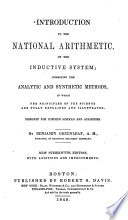 | Benjamin Greenleaf - Arithmetic - 1849 - 336 pages
...descending series ? What are the extremes of a series ? What the means ? What five things are mentioned, any three of which being given, the other two may be found ? 2 6 138 5*4 1&2 486 1458 The factors of 1458, are 3, 3, 3, 3, 3, 3, and 2, the last of which is the... | |
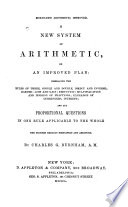 | Charles Guilford Burnham - 1850 - 350 pages
...are to be considered, viz. : the first and last terms, the number, common difference, and sum of all the terms ; any three of which being given, the other two may be found. 1. If I buy 4 books, giving 2 cents for the first, 4 for the second, and so on, with a common difference... | |
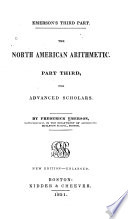 | Frederick Emerson - Arithmetic - 1851 - 342 pages
...What by the common difference ? What is Theorem 1st ? 2d? 3d? 4th? What five things are mentioned, any three of which being given, the other two may be found ? I. The extremes and number of terms being given, how can you find the sum of all the terms ? II.... | |
 | Sarah Porter - Arithmetic - 1852 - 286 pages
...„ L 3. The number of terms ,, N 4. The common difference „ D 5. The sum of all the terms „ S Any three of which being given, the other two may be found. The following, is a summary of all we have already proved by the preceding investigation : — S =... | |
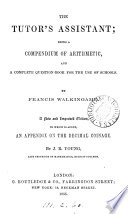 | Francis Walkingame - 1855 - 186 pages
...last term I. 3. The number of terms те. 4. The equal difference d. 5. The sum of all the terms S. Any three of which being given, the other two may be found. The first, second, and third of the above five things given, to find the fifih. RULE. Multiply the... | |
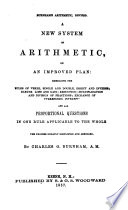 | Charles Guilford Burnham - 1857 - 342 pages
...are to be considered, viz. : the first and last terms, the number, common difference, and sum of all the terms ; any three of which being given, the other two may be found. 1. If I buy 4 books, giving 2 cents for the first, 4 for the second, and so on, with a common difference... | |
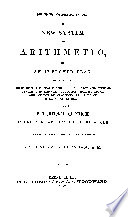 | Charles Guilford Burnham - Arithmetic - 1857 - 328 pages
...are to be considered, viz. : the first and last terms, the number, common difference, and sum of all the terms ; any three of which being given, the other two may be found. 1. If I buy 4 books, giving 2 cents for the first, 4 for the second, and so on, with a common difference... | |
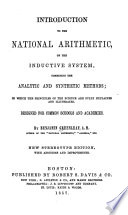 | Benjamin Greenleaf - Arithmetic - 1857 - 336 pages
...descending series ? What are the extremes of a series ? What the means ? What five things aro mentioned, any three of which being given, the other two may be found ? I 2 6 18 54 162 486 1458 The factors of 1458 are 3, 3, 3, 3, 3, 3, and 2, the last of which is the... | |
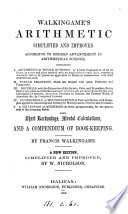 | Francis Walkinghame - 1859 - 200 pages
...«tremes. Let <и= the number of terms, jd= the common difference or equidifference. * s = the sum of all the terms. Any three of which being given, the other two may be found. I. The first, second, and third terms given to find thefißh. RULE. Multiply the sum of the two extremes... | |
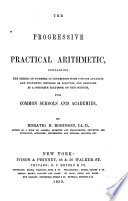 | Horatio Nelson Robinson - Arithmetic - 1859 - 348 pages
...the difference between any two adjacent terms. 437. There are Jive parts in an arithmetical series, any three of which being given, the other two may be found. They are as follows : the first term, last term, common difference, number of terms, and sum of all... | |
| |